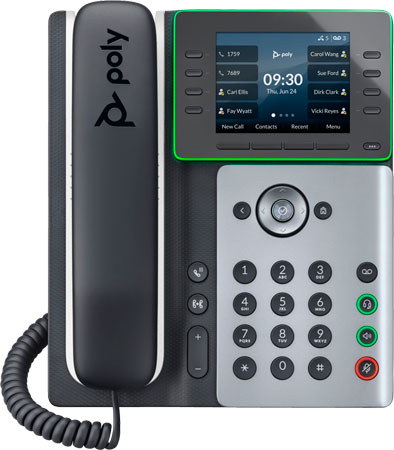Over the past four decades, the telecommunications industry has been revolutionized by what we can broadly called internet technologies.
When it comes to business communications, nowhere is the revolution more clearly seen than with telephones.
Rather than use the POTS (Plain Old Telephone Service) or PSTN (Public Switched Telephone Network) that traditional telecommunications relied upon, now we use what you might call business internet phones.
Internet. Phone. What, you ask us, is an internet phone?
The simple answer: “internet phone” is another name for “VoIP phone” or “IP phone.” The I in both VoIP and IP stands for Internet, after all.
Exploring the term internet phone is a good way to understand just how big of a revolution business communications has actually gone through.
And it’s a great way to understand the benefits that business internet phones bring to you.
In this blog, we introduce the topic of business internet phones.
Let’s get into it!

Business Internet Phones
Over the years in this blog, we’ve talked about VoIP phones a lot. We are IP Phone Warehouse, after all — it’s our expertise.
We wrote a comprehensive review of the topic in our VoIP Phones Buyer’s Guide that we regularly update to make sure it’s always current.
Now, it is the case that internet phones are VoIP phones, and VoIP phones are internet phones.
Using internet technologies opens up a wide range of improvements compared with using older telephone infrastructure.
For one thing, the internet is a multi-use system. As a society, we don’t need to have multiple cables for telephones, TV, and so on anymore. We just need a good infrastructure of fiber and copper internet cables and data centers for everything to run over.
The same applies to your business. You only need to worry about establishing a professional IP network: network switches, Wi-Fi routers, Ethernet drops, and so on.
Then you can use the same infrastructure for connecting computers to the internet, communicating on your phones, keeping your premises safe with IP cameras, and more.
Internet phones are controlled through the IP network, so you can connect it to the phone system via an Ethernet cable or Wi-Fi, depending on what the phone supports.
That means that you get centralized control of all the phones from a web-based user interface or application, rather than needing to go to each phone individually.
An internet phone system is much easier to manage. It’s easier to assign and view profiles, it’s easier to scale the system, it’s easier to enable and disable features, and so on.
Internet phones generally offer much better audio quality than landline phones. They might support advanced noise cancellation features that filter out background noise using machine intelligence.
Internet phones can integrate with other forms of business communications like video conferencing, corporate chat, and more. When your communications are all integrated, this is called unified communications.
VoIP phones also can integrate with property management systems (PMS) in hotels, Customer Relationship Management (CRM) platforms to improve sales, and more.
A big advantage is using the same internet phone for multiple workers via hot desking. That can be for hybrid workers or for shift workers. You only need one phone for multiple workers, and they still get their individual profile, contact list, calendar, etc.
It also means that, depending on the online business phone service you use, you can integrate smartphones into the business phone system. That means you get your secure business calls on your mobile phone.
But let’s be clear: you can’t just plug an internet phone into any old Ethernet outlet or connect it to Wi-Fi and expect it to work.
An internet phone requires an internet phone service, which could be a cloud phone service or a premise-based phone system that’s connected to phone service.
When you plugged in your old telephone, it didn’t just work. You need to set it up with the local phone service provider. It’s the same with internet phones for business: you need an internet phone service provider.
If you’d like to know more about internet phone services — both cloud-based and on-premise — check out a deep-dive in our VoIP Phone Systems Buyer’s Guide.
What makes a business internet phone different from a residential internet phone?
For the most part, residential internet phones are traditional phones that you use with an adapter to connect to the internet. A couple popular examples of adapters are magicJack and Ooma Velo. A residential phone won’t have nearly as many features.
You almost certainly will not be able to use a business internet phone with your residential phone service. If you’re wondering what phones are compatible with your residential internet phone service, contact them.
A business internet phone will have more and different features than a residential phone, including improved security features.
To be an internet-connected phone, a VoIP phone must be a computer, like how your smartphone isn’t just a phone: it’s an advanced computer that, among lots and lots and lots of things, can handle phone calls.
(Could you imagine, if you grew up in the 80’s or 90’s, that you’d be holding in your hand a computer that’s literally thousands of times more powerful than your old 486 or Macintosh…)
In fact, an internet phone doesn’t need to be a physical desk phone at all!
It can be your smartphone that you use with an app. It can be an app on your computer that you use with a headset.
In these cases, you’ll often see the term softphone, which is a combination of software and phone.
Many younger workers prefer to use softphones over using physical phones, whereas many older workers prefer having a dedicated physical phone. By using a business internet system, you can accommodate the preferences of everyone easily.
There are many advantages to internet phones.

